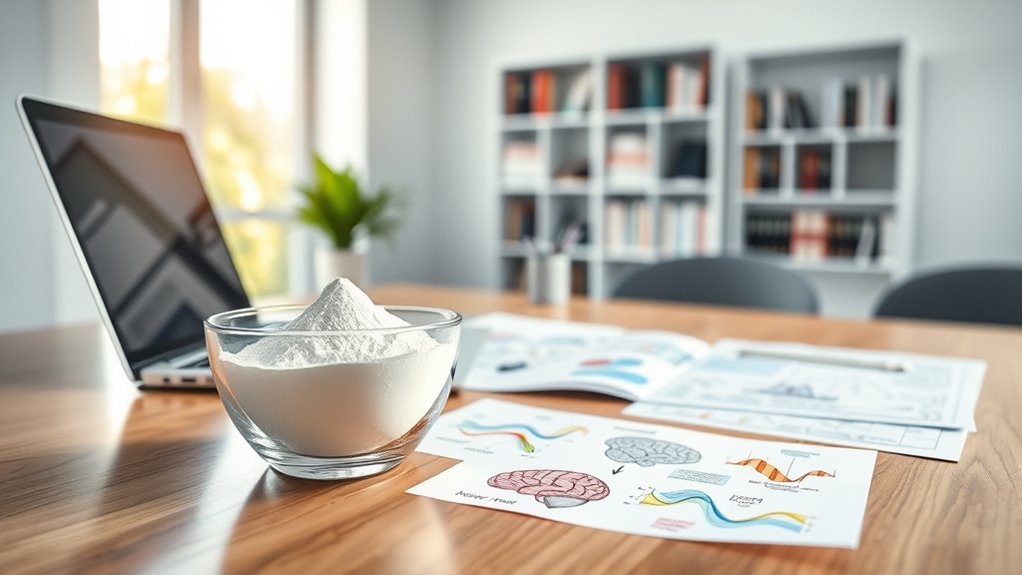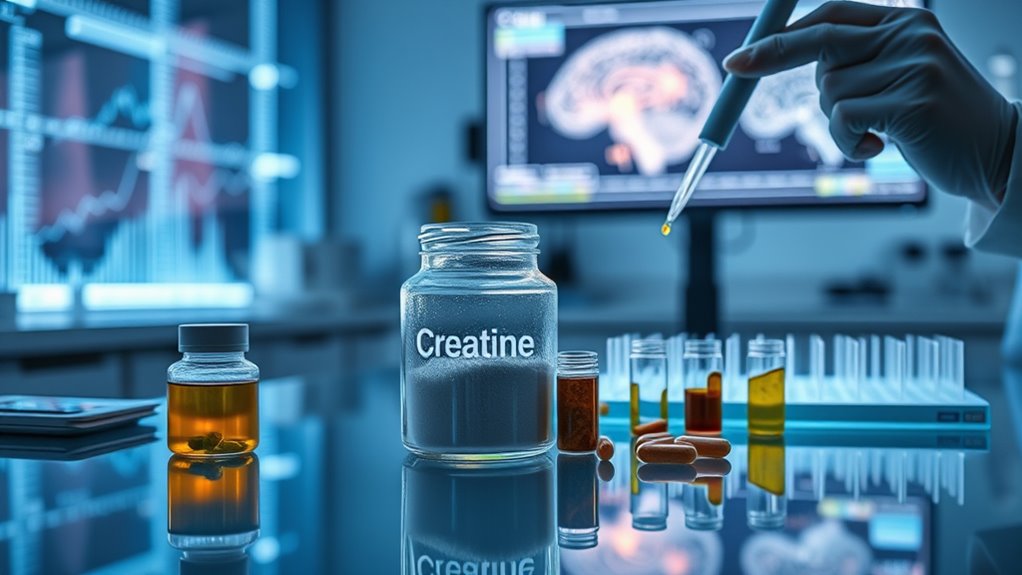Creatine isn’t just for athletes; it can boost your brain power and metabolic health too. By supporting energy production, it improves memory, focus, and mood, especially as you age. It helps regulate blood sugar and enhances fat metabolism, promoting overall liveliness. Taking a daily dose of 3-5 grams can make a difference. Want to discover how to incorporate it safely and effectively? Keep exploring to learn more about accessing these benefits.
Key Takeaways
- Creatine supports brain energy production, enhancing memory, focus, and cognitive resilience in non-athletes.
- It improves metabolic health by increasing insulin sensitivity and aiding blood sugar regulation.
- Creatine helps reduce mental fatigue and stabilize mood through supporting neural energy and neurochemistry.
- Regular supplementation (3-5 grams daily) may slow age-related cognitive decline and boost mental clarity.
- Creatine’s safety and efficacy are backed by research, making it a practical supplement for overall vitality beyond athletic performance.
Understanding Creatine Beyond Muscle Growth

While many associate creatine primarily with muscle building, its benefits extend far beyond that. Understanding creatine beyond muscle growth means recognizing its broader role in your body’s functions. When considering creatine supplementation, proper creatine dosage is essential to maximize benefits and minimize side effects. Typically, a daily creatine dosage of 3-5 grams is effective for most people. Creatine isn’t just for athletes; it supports metabolic health by providing energy for various cellular processes. Its role in regenerating ATP, the energy currency of your cells, is crucial for overall vitality. Additionally, research shows that creatine may support brain health by enhancing cognitive functions and protecting against neurological decline. The metabolic processes that creatine influences are vital for maintaining overall health and energy balance. Incorporating evidence-based supplementation strategies can optimize its benefits and ensure safe use. By incorporating the right creatine supplementation into your routine, you can experience benefits that go well beyond physical performance, impacting your energy levels, mental clarity, and overall well-being.
How Creatine Supports Brain Function

Creatine plays a vital role in supporting brain function by providing a readily available energy source for neural activity. When you take creatine, it helps replenish ATP, the brain’s primary energy molecule, especially during demanding tasks. Ideal creatine dosages for cognitive support typically range from 3 to 5 grams daily, making supplementation simple and safe. This boost in energy can enhance focus, mental clarity, and resilience during intense brain training or stressful situations. By maintaining adequate creatine levels, you support overall brain health and efficiency. Incorporating creatine into your routine can, thus, improve your mental performance, especially when facing cognitively demanding activities. Consistent intake guarantees steady benefits and sustained brain support over time. Understanding supplement dosages is crucial for maximizing cognitive benefits safely, particularly considering neurotransmitter function and its impact on mental performance. Additionally, maintaining optimal creatine levels may support metabolic health and overall cellular energy production, further benefiting cognitive processes. Regular supplementation can also enhance neuroplasticity, supporting learning and memory functions over the long term.
The Science Behind Creatine and Memory Enhancement

Research shows that creatine can directly influence memory performance by increasing energy availability in brain cells. When you take creatine, it’s absorbed efficiently through your digestive system, a process known as creatine absorption. Once in your bloodstream, it crosses the blood-brain barrier to reach brain tissues. There, creatine is stored primarily as phosphocreatine, serving as a quick energy reserve for neurons. This enhanced creatine storage supports the production of ATP, the energy currency needed for cellular functions, including those involved in memory formation. By maintaining ideal creatine levels in the brain, you help ensure your neurons have enough energy to operate efficiently, which can improve memory recall and cognitive performance over time. Energy metabolism plays a crucial role in maintaining optimal brain function, especially in relation to cognitive health and memory. Additionally, sufficient energy supply is vital for supporting neuroplasticity and overall brain resilience. Proper creatine levels can also influence brain energy systems, further supporting cognitive processes and mental clarity.
Creatine’s Role in Mood Regulation and Mental Health

Creatine doesn’t just boost physical performance; it also influences your brain chemistry in ways that can improve your mood. By supporting energy production in brain cells, it may help regulate emotions and reduce feelings of depression. Understanding these mechanisms can show you how creatine might benefit your mental health beyond athletic gains. Additionally, its role in brain chemistry underscores how it can positively impact mental health. Since creatine can enhance electric power generation in brain cells, it contributes to better overall neural function and stability.
Creatine and Brain Chemistry
Although commonly associated with athletic performance, creatine also plays a vital role in brain chemistry, influencing mood regulation and mental health. Your brain relies on creatine to support energy production, which affects brain neurochemistry and overall function. Proper creatine dosage is key; research suggests that even modest supplementation can enhance brain phosphocreatine levels, stabilizing mood and supporting mental clarity. Creatine helps maintain the energy supply to neurons, reducing fatigue and promoting a balanced mood. Additionally, understanding how brain energy metabolism impacts neurochemical balance can further optimize creatine’s benefits for mental health. Maintaining adequate neurochemical balance is essential for emotional stability, and creatine’s role in energy supply contributes significantly to this equilibrium. Incorporating creatine into your routine, with appropriate dosage, can contribute to better mental health and emotional stability, emphasizing its importance beyond physical performance. Moreover, supporting brain function through creatine can enhance cognitive processes such as memory and focus, which are vital for daily mental resilience. Research also indicates that creatine’s involvement in neurotransmitter regulation can positively influence mood and cognitive flexibility, making it a valuable supplement for mental well-being.
Mood Enhancement Mechanisms
Since mood regulation depends heavily on the brain’s energy supply, creatine plays a crucial role in supporting emotional stability. When you consume creatine, it’s absorbed efficiently into your bloodstream and transported to brain cells through creatine absorption. Once there, it’s stored primarily as phosphocreatine, helping maintain ATP levels essential for mood regulation. This process ensures your brain has a steady energy supply during emotional fluctuations. Creatine’s influence on mental health involves three key mechanisms:
- Enhancing energy availability in neurons, stabilizing mood swings.
- Supporting neurotransmitter function through consistent creatine storage.
- Reducing mental fatigue, promoting a balanced emotional state.
Impact of Creatine on Energy Metabolism

Creatine helps your body produce more ATP, which is the main energy source for your cells. This boost in energy can improve your daily functioning and reduce fatigue. Understanding how creatine enhances cellular energy stores can reveal its broader benefits beyond athletic performance. Additionally, creatine’s role in supporting metabolic processes can contribute to overall health and cognitive function. Proper energy management through creatine may also influence heat pump efficiency, especially when considering optimal cellular performance. Moreover, supporting efficient home decor organization can benefit from improved energy levels and mental clarity, highlighting the interconnectedness of physical and environmental well-being. For example, lifestyle insights from celebrities often emphasize personal wellness and healthy routines that align with these benefits.
Creatine’s Role in ATP Production
Creatine plays a crucial role in energy metabolism by directly contributing to the production of ATP, the primary energy currency in your cells. When you supplement with creatine, your body absorbs it efficiently through your digestive system, leading to increased creatine levels in your muscles. Once absorbed, creatine is stored mainly in muscle cells, ready to be used for energy. This process supports ATP synthesis:
- Creatine donates a phosphate group to ADP, rapidly regenerating ATP during high-energy demands.
- Elevated creatine storage enhances your muscles’ ability to produce ATP quickly.
- Efficient creatine absorption ensures a steady supply, bolstering energy availability even during cognitive tasks.
Enhancing Cellular Energy Stores
By increasing the amount of creatine stored in your muscles, you can considerably boost your cellular energy reserves. This enhancement supports cellular respiration, allowing your mitochondria to produce ATP more efficiently. Creatine acts as a quick energy buffer, helping maintain mitochondrial function during energy-demanding tasks. This means your cells can generate and store more energy, which benefits overall metabolic health. Additionally, supporting energy metabolism can have positive effects on cognitive function and mental clarity. Here’s a quick comparison:
| Benefit | Explanation |
|---|---|
| Improved mitochondrial function | Creatine supports mitochondrial efficiency during respiration |
| Increased energy reserves | More stored creatine means more readily available ATP |
| Enhanced cellular respiration | Better energy production boosts cell performance |
Understanding energy pathways is essential for appreciating how creatine influences metabolic processes. This process helps optimize energy flow at the cellular level, supporting cognitive and metabolic health even in non-athletes.
Dosage and Safety Considerations for Non-Athletes

Even though you’re not an athlete, it’s important to follow recommended dosages and safety guidelines when considering creatine supplementation. Start with a daily dose of about 3-5 grams, which is effective and safe for most non-athletes. Keep these points in mind:
- Hydration concerns: Creatine pulls water into your muscles, so staying well-hydrated is essential to prevent dehydration.
- Dosage timing: Taking creatine consistently at the same time each day, preferably with a meal, optimizes absorption.
- Monitoring safety: Watch for any gastrointestinal discomfort or unusual symptoms, and consult a healthcare professional if needed.
Stick to recommended doses, prioritize hydration, and follow proper timing to maximize benefits safely.
Combining Creatine With Other Cognitive Boosters

You can boost your mental performance by combining creatine with other cognitive enhancers, which may create synergistic effects. But it’s important to understand how to do so safely and avoid potential interactions. Enhanced brain energy and focus could be within your reach if you choose your supplements wisely.
Synergistic Cognitive Effects
Combining creatine with other cognitive enhancers can produce synergistic effects that surpass the benefits of using each supplement alone. This synergy can boost neuroplasticity enhancement and creativity stimulation more effectively. Imagine a scenario where:
- You experience sharper focus and quicker problem-solving.
- Your brain adapts faster to new information, thanks to enhanced neuroplasticity.
- Your creative ideas flow more freely, driven by improved cognitive flexibility.
Combining Supplements Safely
While mixing creatine with other cognitive boosters can enhance mental performance, it’s essential to do so safely. Proper supplement stacking involves understanding appropriate creatine dosage and how different substances interact. Start with recommended doses—typically 3-5 grams daily—and avoid exceeding safe limits. Combining supplements without guidance may lead to unwanted side effects or diminished benefits.
| Supplement | Recommended Use | Notes |
|---|---|---|
| Creatine | 3-5 grams daily | Safe, well-studied dosage |
| Caffeine | 50-200 mg as needed | Boosts alertness temporarily |
| L-Theanine | 100-200 mg with caffeine | Reduces jitteriness |
Always research and consult a healthcare professional before stacking supplements.
Enhanced Brain Energy
Enhancing brain energy often involves combining creatine with other cognitive boosters to maximize mental performance. To optimize creatine absorption, pair it with compounds like caffeine or omega-3s, which can improve its uptake and effectiveness. Doing so can lead to sharper focus and faster mental clarity. Be mindful of potential creatine side effects, such as mild stomach upset, especially if you take high doses or combine it with other stimulants. Here are some ways to boost brain energy effectively:
- Combine creatine with antioxidants like vitamin E for cellular protection.
- Use nootropics that enhance neurotransmitter function alongside creatine.
- Maintain proper hydration to support creatine absorption and minimize side effects.
This approach helps you harness creatine’s full cognitive potential safely.
Potential Benefits for Age-Related Cognitive Decline

As research explores strategies to combat age-related cognitive decline, creatine has emerged as a promising supplement with potential benefits. Studies suggest that supplementing with the right creatine dosage can support brain energy metabolism, which often declines with age. To maximize these benefits, you should consider careful creatine sourcing—preferably high-quality, pure creatine monohydrate from reputable providers. This ensures consistent potency and reduces the risk of contaminants. While ideal dosages may vary, common recommendations range from 3 to 5 grams daily. Incorporating creatine into your routine might help improve memory, mental clarity, and overall cognitive function as you age. Always consult a healthcare professional before starting supplementation, especially if you have existing health conditions.
Creatine and Metabolic Health: Managing Blood Sugar and Fat Levels

Have you ever wondered how creatine might influence your metabolic health? Research suggests it can support blood sugar regulation and fat metabolism. Here’s how:
Creatine may boost insulin sensitivity and promote fat burning for better metabolic health.
- Creatine improves insulin sensitivity, helping your body use blood sugar more efficiently.
- It enhances fat metabolism, making it easier to burn stored fat for energy.
- Creatine may reduce markers of metabolic syndrome, lowering your risk of related health issues.
Practical Tips for Incorporating Creatine Into Your Routine

Incorporating creatine into your routine is straightforward and can be tailored to fit your lifestyle. Start with a common approach: take 3–5 grams daily, ideally with a meal or a glass of water. Don’t fall for creatine myths that suggest it’s only for athletes; many non-athletes benefit from cognitive and metabolic support. To avoid misconceptions, stick to reputable brands and check legal considerations—creatine is legal and widely accepted. Consistency is key, so set a reminder or integrate it into your daily habits. If you’re concerned about side effects or interactions, consult a healthcare professional. Incorporating creatine gradually helps your body adapt, and over time, you’ll likely notice its positive effects on energy, focus, and metabolic health without disrupting your routine.
Frequently Asked Questions
Can Creatine Improve Focus During Long Work Sessions?
You might find that creatine improves your focus during long work sessions by boosting mental stamina. It helps enhance focus by supporting your brain’s energy production, making it easier to stay attentive. Many non-athletes notice better cognitive function and reduced mental fatigue with creatine supplementation. If you’re looking for a natural way to sustain concentration and improve mental endurance, creatine could be a helpful addition to your routine.
Does Creatine Interact With Common Medications for Mental Health?
It’s a coincidence that you’re asking about creatine and mental health medications. Creatine can interact with some drugs, affecting medication safety or altering how your body processes them. While research is limited, it’s wise to consult your healthcare provider before adding creatine to your routine, especially if you’re on medication. They can guide you on potential drug interactions and make certain your supplement use remains safe and effective.
Are There Differences in Creatine Benefits Between Genders?
You might wonder if creatine benefits differ between genders. Due to hormonal differences and metabolic variations, women and men can experience distinct effects. Women may see more pronounced cognitive benefits, while men might gain more from metabolic improvements. However, individual responses vary, so it’s best to monitor how your body reacts. Always consult with a healthcare professional before starting creatine, especially if you have hormonal or metabolic concerns.
How Long Does It Take to See Cognitive Benefits From Creatine?
Imagine opening sharper focus and mental clarity—how quickly can you see these effects? Typically, after about a week of consistent creatine intake, you might notice cognitive improvements. It depends on creatine absorption and your dosage timing; taking it regularly, with meals or post-workout, helps optimize benefits. Stay patient and consistent, and your brain may start reaping the rewards in just a few days.
Can Creatine Help With Sleep Quality or Circadian Rhythms?
You might wonder if creatine influences sleep quality or circadian rhythms. While research suggests creatine’s role in sleep regulation and its potential circadian impact, evidence isn’t conclusive. It could help stabilize energy levels, indirectly supporting better sleep patterns. However, individual responses vary, and more studies are needed. If you consider supplementing, consult a healthcare professional to see if creatine aligns with your sleep and circadian needs.
Conclusion
Now that you know how creatine can boost your brain and metabolism, imagine revealing even more benefits with just a simple addition to your routine. Could this powerful supplement be the key to sharper memory, better mood, and healthier aging? The possibilities are intriguing—and the next step is yours. Don’t wait too long to explore what creatine might do for you. The potential is there, ready to be uncovered—are you ready to take the leap?









